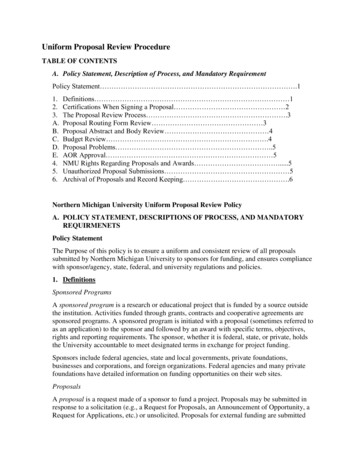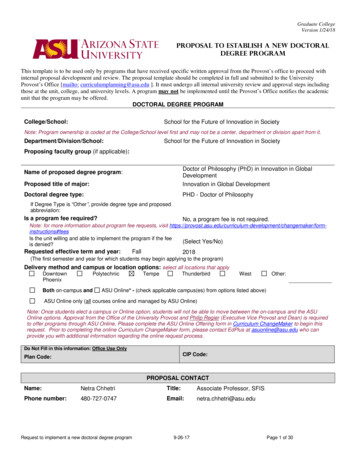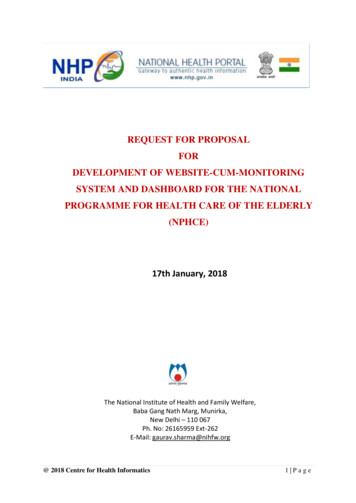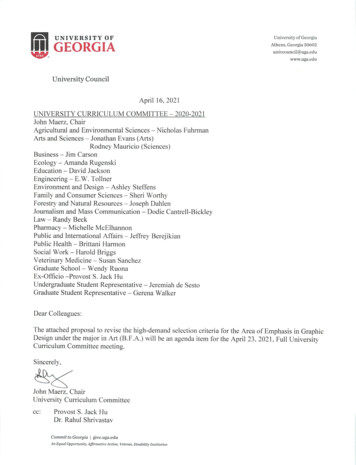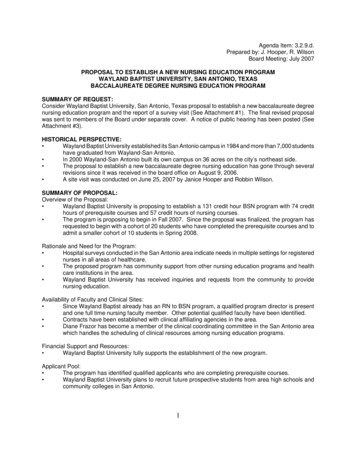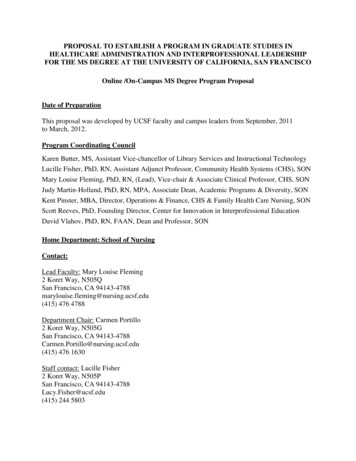
Transcription
PROPOSAL TO ESTABLISH A PROGRAM IN GRADUATE STUDIES INHEALTHCARE ADMINISTRATION AND INTERPROFESSIONAL LEADERSHIPFOR THE MS DEGREE AT THE UNIVERSITY OF CALIFORNIA, SAN FRANCISCOOnline /On-Campus MS Degree Program ProposalDate of PreparationThis proposal was developed by UCSF faculty and campus leaders from September, 2011to March, 2012.Program Coordinating CouncilKaren Butter, MS, Assistant Vice-chancellor of Library Services and Instructional TechnologyLucille Fisher, PhD, RN, Assistant Adjunct Professor, Community Health Systems (CHS), SONMary Louise Fleming, PhD, RN, (Lead), Vice-chair & Associate Clinical Professor, CHS, SONJudy Martin-Holland, PhD, RN, MPA, Associate Dean, Academic Programs & Diversity, SONKent Pinster, MBA, Director, Operations & Finance, CHS & Family Health Care Nursing, SONScott Reeves, PhD, Founding Director, Center for Innovation in Interprofessional EducationDavid Vlahov, PhD, RN, FAAN, Dean and Professor, SONHome Department: School of NursingContact:Lead Faculty: Mary Louise Fleming2 Koret Way, N505QSan Francisco, CA 94143-4788marylouise.fleming@nursing.ucsf.edu(415) 476 4788Department Chair: Carmen Portillo2 Koret Way, N505GSan Francisco, CA 94143-4788Carmen.Portillo@nursing.ucsf.edu(415) 476 1630Staff contact: Lucille Fisher2 Koret Way, N505PSan Francisco, CA 94143-4788Lucy.Fisher@ucsf.edu(415) 244 5803
Table of ContentsSection .71.8Figure 1Section 22.12.22.32.3.12.3.22.3.32.3.4Table 12.42.52.62.72.82.92.102.112.11.1Section 33.13.23.33.4Introduction . . . .Aims and Objectives . General Overview of the Program .Historical Development of the Field .Institutional and School of Nursing Strengths . .Relationship of the Proposed Program to Existing Programs at UCSF . .School of Nursing, Department of Community Health Systems .Center for the Health Professions . .Clinical & Translational Science Institute . Center for Innovation in Interprofessional Healthcare Education . Pathways to Discovery Program . .Relationship of the Proposed Program with Other UC Institutions.Administration and Governance of the MS Program . .Plan for the Evaluation of the Program .Timetable for Program Development and Approval. Timeline to Develop the MS Program . .MS Program . . Requirements for Admission . Foreign Language . Program of Study .Specific Fields of Emphasis . .Plan for a Master’s Program . . .Unit Requirements . . .Required Courses . . .Curricular Grid . . . Field examination: Grading . . . . .Qualifying Examination . . . .Thesis and/or dissertation . . .Comprehensive Examination . Special Requirements . . .Relationship to Doctoral Programs . . .Special Preparation for Careers in Teaching .Normative time from Matriculation to Degree . .Advancement to Candidacy . .Projected Need . .Student Demand for the Program .Opportunities for Placement of Graduates . Importance to the Health Professions . .Ways in Which the Program will Meet the Needs of Society 20202020202021212223232
3.53.6Section 4Section 55.15.1.15.1.25.1.35.1.45.25.3Section 66.16.1.16.1.26.1.36.1.4Figure 26.26.36.46.56.66.76.7.1Figure 3Table 2Section 7Section 8AppendicesAppendix AAppendix BAppendix CAppendix DAppendix EAppendix FAppendix GRelationship of the Program to Research/Professional Interests of Faculty .Program Differentiation .Faculty . . .Courses . . Proposed Online Courses . Track 1: Leadership and Change .Track 2: Health systems Research, Data Management and Evaluation Track 3: Interprofessional Teamwork Track 4: Health Systems Management .Proposed Administrative Practicum . . .Proposed On-Campus Classes . . .Resource Requirements . .Program Organization Program Director .Curriculum Specialist Program Faculty .Program Assistant .Organizational Chart of Program Team . .Library Acquisitions . Computing Requirements . Equipment . Space and Other Capital Facilities . .Other Operating Costs . .Program Budget and Fees . Self-sustaining Fiscal Model . .Revenue/Expenditure Variance by Year Six-Year Fiscal Forecast . .Graduate Student Support . . . Changes in Senate Regulations . .References 14142434344CPEC QuestionnaireCatalogue Course DescriptionsCAHME Accreditation ProcessMarketing and Feasibility StudiesList of Proposed Faculty Members and Bio-sketchesSample On-Campus Course Agenda: Quarter I – Executive Weekend FormatLetters of Support from Schools, Departments and Programs3
SECTION 1: INTRODUCTIONThe UCSF School of Nursing (SON) is proposing a new Master of Science (MS) degree inHealthcare Administration and Interprofessional Leadership to meet the demands of thechanging health care environment, increase the number of trained healthcare leaders ininterprofessional teamwork, and generate a source of revenue for the School of Nursing. Thisprogram is unique among University of California graduate programs. Its vision is to prepare acadre of interprofessional leaders to effect essential change in the healthcare system.This graduate degree program is designed to accommodate the schedules and learning needs ofworking professionals through a blended online/on-campus program design. This curricularformat will allow students, from across the country and around the world, to have access to thehigh quality education for which UCSF is known. In addition to reaching larger numbers ofqualified students, the program’s flexible design will meet many of the needs of a diverseworkforce. The blended on-campus/online model for advanced study can be accomplished infour quarters while students continue to live and work in their home environment.The Healthcare Administration and Interprofessional Leadership (MHA-IL) program is aresponse to local, national and international calls for graduate healthcare education to movebeyond discipline-based silos. The course selection, program design and mode of delivery ensureacademic integrity while promoting access to a novel and innovative program. The program isdeveloped in collaboration with the UCSF Center for the Health Professions (CHP) and alignswith the UCSF Chancellor’s support for online and interprofessional health education. The newprogram also complements the work of the Center for Innovation in Interprofessional Educationand the Clinical and the Translational Science Institute (CTSI), all located at UCSF, easingaccess, support and cooperation among programs.The MHA-IL program conforms to the MS Plan II of the UCSF Graduate Council Regulationsand Rules which requires 36 academic units and a comprehensive exam. The target date foradmission of the first cohort of 32 students is Fall Quarter, 2013. A new cohort of 32 studentswill be admitted in each successive quarter.1. 1 Aims and ObjectivesThe UCSF SON is consistently ranked as one of the nation’s highest regarded academicinstitutions for the professions of nursing and medical sociology. It is recognized for the caliberof faculty and students and the excellence of its research, teaching, and service programs. TheSON has prepared nurse leaders for management roles for many decades. In today’s complexenvironment however, organizations are looking towards interprofessional leadership paradigmsto manage and meet goals for high quality care, patient safety and satisfaction, and workforceengagement. The proposed MHA-IL program continues and extends the SON’s trajectory ofpreparing leaders by expanding and replacing the existing MS program with a focus in Nursingand Health Systems Leadership.The MHA-IL program contrasts with the current MS program in six major ways: 1) the length ofthe program is reduced from two years to 12-months; 2) students are able enroll at the start of4
each quarter rather than once a year; 3) a blended model of online and on-campus academiccourses is used; 4) academic activities and professional experiences are grounded ininterprofessional science; 5) admission to the program is expanded to include post-baccalaureateprepared nurses and non-nurses in the health care sciences (e.g., social work, pharmacy,dentistry, gerontology, occupational and physical therapy), and 6) the program is self-supporting.The MHA-IL program aims to increase the number of well-prepared leaders across the countryand internationally. The demand for graduate education is steadily rising. In nursing alone, over14,000 applicants were turned away from graduate programs in 2011. Healthcare providersprepared in many of the allied health professions also desire accessible graduate education.According to the Commission on Accreditation Healthcare Management Education, a master'sdegree is becoming the standard credential for most medical or healthcare manager positions.The proposed program aims to provide maximum accessibility to high quality UCSF educationfor a large number of students through distance-learning modalities. When fully implemented inyear two, the program will enroll 128 new students annually.Proposed changes to the current MS program and rationale for instituting a new MHA-IL degreeprogram are discussed below.1) The length of the program is reduced from two years (6 quarters) to 12-months (4 quarters)Rationale: The new program curriculum is constructed to meet the rigorous standards of a UCeducation using a delivery format compatible with the needs of working professional, adultlearners. Course content is revised to decrease redundancy and strengthen essential knowledgeand skill components. The reduced program length is attractive to working students who areeager to advance in their careers and wish to minimize disruption in family obligations.2) Students are able to enroll at the start of each quarter rather than once a yearRationale: The program responds to the needs of adult learners by increasing the number of entrypoints from once a year to four times in the academic year. Quarterly entry points are compatiblewith the Campus and SON admission procedures. These quarterly entry points along with aflexible curricular design allow students to enroll in the program at their convenience, or take aneeded leave of absence without incurring untoward delays in completing the program.3) A blended model of online and on-campus academic courses is usedRationale: The blended online/on-campus model meets the needs of the non-traditional, adultstudent population. The online component is convenient for full-time employees, internationalstudents and those living outside the Bay Area. The on-campus component provides three faceto-face sessions when students engage with UCSF faculty and their colleagues, build the UCSFcommunity, and develop a strong network of healthcare leaders. The administrative practicum,arranged at the student’s work site, allows the student to contribute to their place of employmentand their local community. Employer support for the student’s educational activities is alsoenhanced by enabling students to remain in the workforce and participate in projects that benefitthe organization.5
4) Academic activities and professional experiences are grounded in interprofessional scienceRationale: The World Health Organization (WHO), the Institute of Medicine (IOM) and nationalstudy groups have challenged educational institutions to embrace interprofessional pedagogicapproaches to strengthen health systems and improve healthcare outcomes. Interprofessionalscience, teamwork and collaborative management and leadership practices serve as foundationaltenets of this program. Interprofessional leadership, a unique focus of the program’s curriculumdistinguishes this MS degree from other graduate programs offered in health administration.5) Admission to the program is expanded to include post-baccalaureate prepared nurses and nonnurses in the health care sciencesRationale: Enlarging the applicant pool to include professionals from varied disciplines mirrorsthe realities of healthcare in which managers, staff, and clinicians from multiple backgroundsinteract with each other and healthcare consumers. All too frequently, decision-making andcommunication suffer from inter-discipline misunderstandings. The program affords students ofdiffering health science backgrounds the opportunity to learn together and create a network ofinterprofessional colleagues. Graduates will transfer teamwork skills into their workplace, pavingthe way for collaborative practice.6) The proposed program is self-supportingRationale: Revenue from student fees is the source of funding for all program costs includingfaculty and staff salaries and operational expenses. Fiscal projections, further discussed inSECTION 6, indicate that by year two of program operation, revenues will cover expenditures.In year three and forward, revenue generated will fund program reserves, provide funding foradditional faculty, staff and operating needs, contribute to the CHS department and SON budget,and provide scholarship funds for students in the program. The SON is particularly invested insupporting students from underrepresented groups. We also anticipate using revenue generatedfrom the program to attract matching funds from foundations and individuals to assist withdeveloping a consistent source of funding for students.1.1.1 General Overview of the ProgramThe MHA-IL program is a response to local, national and international calls for graduate healthcare education to move beyond discipline-based silos. The plan of study is grounded in evidencebased management and leadership tenets and designed to address knowledge and skill acquisitionthrough integrating multi-layered competencies within an interprofessional framework. Programgraduates will be prepared to influence changes in health care organizations that are costeffective, address quality and safety issues and improve access to care for diverse and complexpatient populations.The program of study is comprised of four curricular tracks: 1) leadership and change; 2) healthsystems research, data management and evaluation; 3) interprofessional teamwork, and 4) healthsystems management. Each track includes substantive content in critique and application ofscience based theories related to organizational complexity, leadership, innovation, healthcarepolicy and economics, business practices, and managing and developing human capital.Coursework, educational activities and professional experiences are presented in three major6
formats including synchronous and asynchronous interactive web-based courses; in-personlectures, discussions and small group exercises; and a mentored administrative practicum at thestudent’s employment site.Sixteen online courses are offered in 8 week modules. A “carousel” delivery format providesmaximum flexibility for matriculation. Three on-campus classes totaling seven days occur at theend of the first, third, and fourth quarters of the program. The goal of on-campus courses is tointegrate the learning objectives of online coursework. These courses also provide face to faceopportunities for students to meet their online colleagues, work directly with UCSF faculty andguest speakers, and engage in essential interprofessional learning activities. Competenciesacquired through online and on-campus coursework closely link theory to practice in 120 hoursof administrative practicum. Practicums provide practical application of theory and idealizedinterventions for change in the student’s real-world work environment. Collectively, online, oncampus, and practicum courses prepare graduates with a nuanced understanding of the healthcarecontext, interprofessional competencies in management and leadership, and the knowledge andskills to institute change in practice.The MHA-IL program meets criteria of the Policy on Self-Supporting Graduate DegreePrograms and the Implementation of Guidelines for the Policy on Self-Supporting GraduateDegree Programs (2010) from the UC Office of the President. Admission standards andacademic quality are equivalent to current on-campus programs. A cohort of 32 students will beadmitted each quarter (four cohorts per year).Students can complete the program in one calendar year and achieve a MS degree granted by theGraduate Division. The program format allows non-traditional, working adults access tograduate education. We anticipate larger numbers of diverse applicants and a requisite increasein graduates from underrepresented groups because of the length and blended design of theprogram. As previously stated and further discussed in SECTION 6, the fiscal viability of theprogram as a self-supporting model is positive.Plans to select an education vendor to support the online learning system for the program are inprocess. UCSF administration, the SON Dean, and the Program Director are exploring arelationship with two major online vendors to provide package of services to the program.Services under consideration include start-up funding for the planning year FY2012-13, programwebsite development, training in online course development for faculty and staff, technicalsupport for students, faculty, and teaching assistants/instructors, and full responsibility formarketing and recruitment. We anticipate that a vendor, experienced in providing graduate levelonline services to top tier universities, will be selected by July 2012. The cooperative effortbetween the program and the vendor distinguishes clearly between technical (vendor) andacademic (program) aspects and responsibilities. The SON and the MHA-IL program hold soleresponsibility for admission decisions and academic content.1.2 Historical Development of the Field and Institutional StrengthsBeginning in the mid-to-late 1990’s, health policy direction shifted towards operational andfinancial structures that promote comprehensive systemic change in the way care and services7
are delivered. Multiple factors contributed to this change in policy, including the increasingproportion of the population in older age groups, the growing incidence of chronic illness, andthe consumer education movement. Cost containment and the growth of managed care programsbegan to shape the healthcare industry and accelerate the need for new models of leadership toaddress the complex problems and fast-paced changes in healthcare organizations.National and international organizations including the IOM, the WHO, the Inter-professionalEducation Collaborative (IEC) and the Health Resources and Services Administration (HRSA)recognize the urgency for flexible and distinctive leadership education to transform healthcaresystems. Foremost among the priorities is the need for professionals to collaborate on the designand implementation of effective operational and financial structures at local and regional levels.As far back as 1972, the IOM has been interested in team-based solutions to answer questions ofnational importance to health care. Findings from Crossing the Quality Chasm: A New HealthSystem for the 21st Century (2001) shed light on the need for provider teams to work together tomake care safer, more effective and equitable. Strong recommendations for new training modelswere put forth. Almost a decade later, The Future of Nursing: Leading Change, AdvancingHealth (2010) reports growing evidence of the continuing need for greater interprofessionalapproaches and accountability to enact needed reform – in practice, management and leadership.The WHO Study Group’s Framework for Action on Interprofessional Education & CollaborativePractice (2010) states that effective interprofessional education and collaborative practicestrengthens systems and improves health outcomes. The Study Group recommends movingtoward interprofessional education to ensure that students develop the knowledge required toanticipate trends and lead changes to optimal health services.The Patient Protection and Affordable Care Act (2010) has particular implications for anincrease in demand for well-prepared and experienced healthcare managers and administrators.Provisions expand access to health care coverage, establish structures to improve the quality ofhealth system performance, and authorize funds to operationalize a national strategy forprevention, wellness and public health activities. Of significance to the MHA-IL program are theprovisions for workforce training and development. The emphasis on programs and models toincrease access, prevention and primary treatment will necessitate a workforce of well-preparedhealthcare leaders to enact the vision of extending healthcare to all.In 2011, HRSA and the IEC, representing six national associations of health professions schools,issued the Team-Based Competencies: Building a Shared Foundation for Education and ClinicalPractice report urging academic institutions to design interprofessional programs that strengthenhealth systems and improve health outcomes.It is within this context that the MS degree in Healthcare Administration and InterprofessionalLeadership is proposed.1.3 Institutional and School of Nursing StrengthsUCSF is well positioned to support the proposed program. The UCSF campus is one of thenation’s major centers of patient care, education and research. As a graduate health-science8
campus, teaching efforts center on graduate and post-credentialed professional education. Thecampus is home to the schools of Dentistry, Medicine, Nursing and Pharmacy. UCSF is cited ininterprofessional literature for establishing a common academic calendar across all schools toease access to shared learning experiences for all students.One of the four professional schools, the SON attracts students from around the world. Graduatespecialties consistently rank among the best in US News & World Report assessments ofprofessional graduate programs. In the past decade, the SON has remained in the first two spotsin NIH research funding awarded to schools of nursing. Faculty members practice and teach innumerous public schools, community health centers and hospitals in the Bay Area. In addition tostrong nursing programs, the doctoral program in Medical Sociology offers one of the most indepth curricula broadly conceived in the United States.UCSF is home to the world renowned UCSF Medical Center and Benioff Children's Hospital.The campus also has close relationships with other major health care systems located within theSan Francisco Bay Area. This rich health care environment attracts outstanding students andfaculty and provides many opportunities for training and employment for our MS level studentsand graduates.Thus, UCSF provides a rich environment for education, research and patient care with multipleprograms, institutes, centers and research units from which to draw faculty and other academicresources to support the MHA-IL program.1.4 Relationship of the Proposed Program to Existing Programs at UCSFUCSF is the ideal location to initiate a new degree program in interprofessional leadership. Threecampus centers are nationally recognized for work in leadership programs, translational scienceand interprofessional studies: the Center for the Health Professions, the Center for Innovation inInterprofessional Healthcare Education and the Clinical and Translational Science Institute. TheSchool of Medicine also hosts the Pathways to Discovery Program which provides learningopportunities for students interested in clinical leadership. Directors of each center or institutehave participated in this proposal development, provided letters of support for establishment ofthe new degree program at UCSF (Appendix G), and agreed to serve as faculty and continue asadvisors for the program. The following sections discuss existing programs most closely alignedwith the proposed MHA-IL program.1.4.1 School of Nursing, Department of Community Health SystemsThe MHA-IL program will extend and replace the current MS in Nursing and Health SystemsLeadership in the Department of Community Health Systems (CHS), SON. The six changesdiscussed previously in Section 1.1 permit the SON to extend its educational reach not only to anational and international audience, but foster novel ways to collaborate with other campusCenters, Institutes and Schools for graduate education. The new program has the unqualifiedsupport of both the CHS department chair and the SON Dean, Dr. David Vlahov. Theirendorsement and commitment to the program is captured in letters of support in Appendix G.9
1.4.2 Center for the Health ProfessionsCHP is an active partner of the SON. The Center’s mission is to transform healthcare thoughworkforce research and leadership development. CHP offers several nationally known leadershipcertificate programs. Some are discipline-specific or are developed expressly for professionals inparticular practice settings. Others, like the highly subscribed Change Agent Program (CAP) andthe California Healthcare Foundation Leadership program, train practitioners across disciplinesin the principles of leadership and change. Dr. Ed O’Neil, the CHP Director and Dr. Mary LouiseFleming, the proposed MHA-IL Program Director are faculty for the CAP program and co-teachtwo courses in the current nursing leadership program in the SON. A number of graduates ofCHP programs have requested that a degree option be developed in addition to certificate-leveltraining. The proposed program addresses this appeal by developing a path toward graduateeducation that is available to professionals across multiple disciplines.1.4.3 Clinical and Translational Science InstituteCTSI is a campus-wide institute that supports clinical and translational research. Dr. ClayJohnston, CTSI Director and UCSF Associate Vice Chancellor of Research is a member of theMHA-IL Program Advisory Group. His letter of support indicates that he believes, “The designof the MHA-IL program is innovative and academically sound and (that) there is a naturalconnection between the MHA-IL program and CTSI.” He and other CSTI faculty like Dr. RalphGonzales will provide guidance based on their experience implementing multi-disciplinaryprograms. The Implementation Science program, for example, provides consultation forinterdisciplinary collaboration and a master’s program in translational medicine. In a focuseddiscussion with Dr. Gonzales, he emphasized the need to move beyond certificate preparationand toward an evidence-based, interprofessional curriculum of study in team science. CTSI’sprimary mission is to translate research into practice and Dr. Gonzales identified that theproposed MHA-IL program will fill an existing gap by preparing students to test theories ofinterprofessional leadership in the realities of the healthcare context.1.4.4 Center for Innovation in Interprofessional Healthcare EducationDr. Scott Reeves, the Founding Director of the Center for Innovation in InterprofessionalHealthcare, a new initiative of the UCSF campus, is a member of the MHA-IL CoordinatingCouncil. The Center’s key focus includes faculty development, continuing education andinterprofessional scholarship. As one of the Center’s major activities is leadership developmentthrough curricula design and implementation, Dr. Reeves intends to play a central role in theprogram’s ongoing development and evaluation. In fact, Dr. Reeves’ recent book,Interprofessional Teamwork for Health and Social Care (2010) is text for the interprofessionalteamwork track in the proposed program curriculum.1.4.5 Pathways to Discovery ProgramThe Pathways to Discovery Program is a multi-disciplinary program of the School of Medicine(SOM) in which students can pursue a special area of interest. Dr. Catherine Lucey, SOM ViceDean for Education and a member of the MHA-IL Advisory Group, confirmed her enthusiastic10
support for the new MS degree program in her letter of support. She notes that many medicalstudents in the Pathways program have an interest in clinical leadership. She believes that theMHA-IL program will provide an additional educational opportunity for these and other UCSFstudents wishing to pursue careers in health care management and leadership.1.5 Relationship of the Proposed Program with Other UC InstitutionsThis MHA-IL is the only MS online/on-campus program within the UC system specificallyaimed to educate post-baccalaureate prepared health care professionals across disciplines. Of theprograms and areas of study at other UC institutions, graduate programs in nursing, businessadministration and public health relate most closely to academic activities proposed in this newdegree program.While several UC campuses offer discipline-specific graduate degrees for professional educationand training, the MHA-IL program differs from these programs by offering admission to healthscience professionals from all disciplines, providing a blended education
Healthcare Administration and Interprofessional Leadership to meet the demands of the changing health care environment, increase the number of trained healthcare leaders in interprofessional teamwork, and generate a source of revenue for the School of Nursing. This program is unique among University of California graduate programs.

